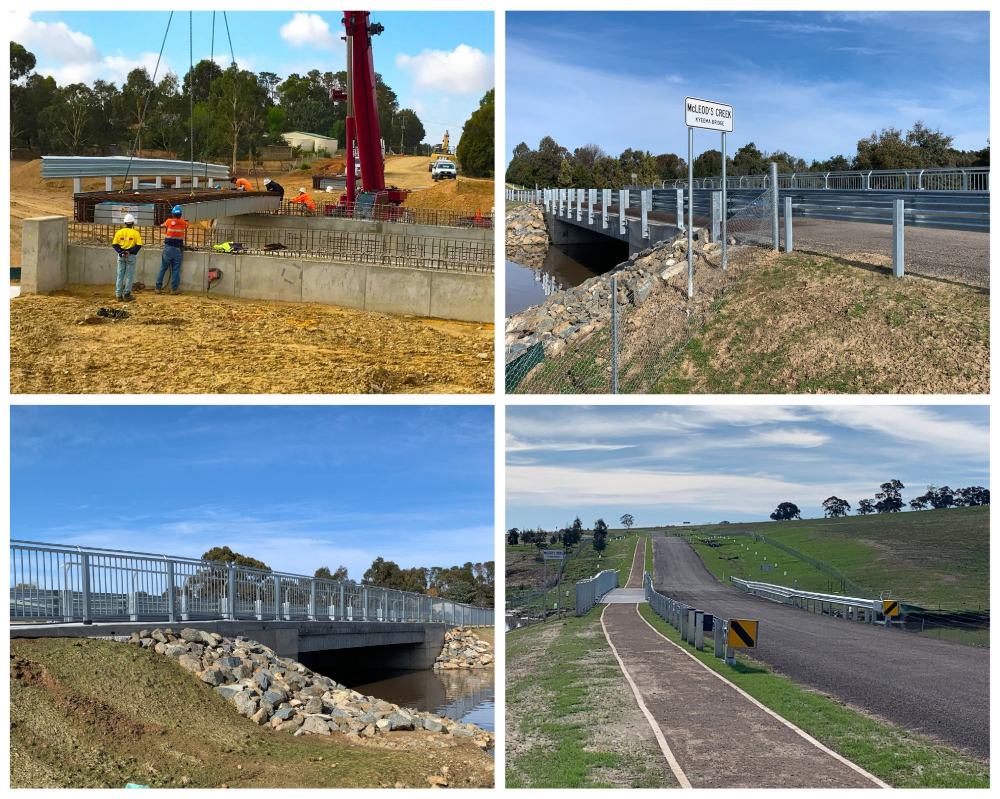An Informational Piece by PT Columnist, David Spring Jacobs

Photo: (Kymee Bridge, NSW, Australia)
Pacific Tenders Magazine Issue 13, July 2023, Honiara- On the picturesque shores of the Bio waterway in the Solomon Islands, a remarkable transformation is taking place. The rhythmic sound of pile driving resonates across the coastal plain as steel and concrete form a striking contrast to the traditional log bridge construction nearby. This is the inaugural installation of an InQuik modular bridge in the South Pacific, marking a significant milestone for an Australian firm with a promising reputation in bridging technology.
InQuik's approach to bridge construction is refreshingly uncomplicated yet innovative. The technology involves using pre-formed steel moulds as permanent formwork, which are then filled with concrete. These prefabricated components come complete with steel reinforcing bars and bracing, simplifying the installation process. Tied into the abutments and piles, the concrete is poured in situ, resulting in a bridge that boasts ease of installation and low maintenance. This unique approach has garnered attention and praise, but does InQuik truly live up to its name in bridging the market gap?
In a market filled with various precast and steel truss bridges, the InQuik bridge system faces tough competition. However, in 2019, the World Bank conducted an evaluation of modular bridges, and InQuik emerged as the top contender. Despite being a relatively young company, established only in 2017, InQuik's technological prowess and potential for rapid bridging solutions earned it the highest rank in the assessment. Four years later, the company's moment finally arrived when it secured a contract for the Solomon Islands Road and Aviation Project (SIRAP).
One might wonder what sets InQuik apart from its competitors, and the answer lies in its constructability advantages. Compared to traditional form-and-pour methods and even other modular bridge options, InQuik stands out with several key benefits. The system requires minimal steel fixing on-site, employs preformed formwork, and eliminates the need for temporary supports, resulting in significant time and labor savings. While some might worry about the impact on local employment, InQuik's ease of installation enables the use of non-skilled labor, striking a balance between efficiency and community engagement.
Maintenance is another area where InQuik shines. With a maintenance regime that only involves regular inspections for the first 50 years, these bridges require minimal intervention. In regions like the Pacific, where maintenance funding and expertise are often scarce, this advantage holds immense value. The World Bank's report attests to the overall cost-effectiveness of InQuik, especially when considering whole-of-life costs and the long-term benefits of low maintenance requirements.
Moreover, InQuik's design adheres to stringent engineering standards, providing a structure that can withstand the test of time. Although the Pacific region might not necessitate the most robust design, the 100-year lifespan ensures future-proof transport solutions and access provisions.
Yet, like any solution, InQuik faces challenges specific to the Pacific context. Factors such as concrete batching, vandalism, and design interfaces require careful consideration. Given the logistical complexities of working in island nations, transportation of materials and equipment remains a significant concern, one that InQuik and other modular systems must address.
Nevertheless, InQuik's ability to provide time-efficient and durable bridges makes it an attractive option for various applications. Disaster recovery efforts, in particular, could benefit from InQuik's rapid installation process, especially in known geotechnical conditions.
As onlookers observe the successful trial of InQuik's technology during the SIRAP project, it becomes evident that this Australian firm is indeed bridging the market gap with its innovative approach to modular bridging. By combining efficiency, durability, and low maintenance, InQuik's bridges promise to connect communities and withstand the test of time in the South Pacific and beyond. With its continued commitment to excellence and innovation, InQuik looks poised to redefine the future of bridge construction, one span at a time.